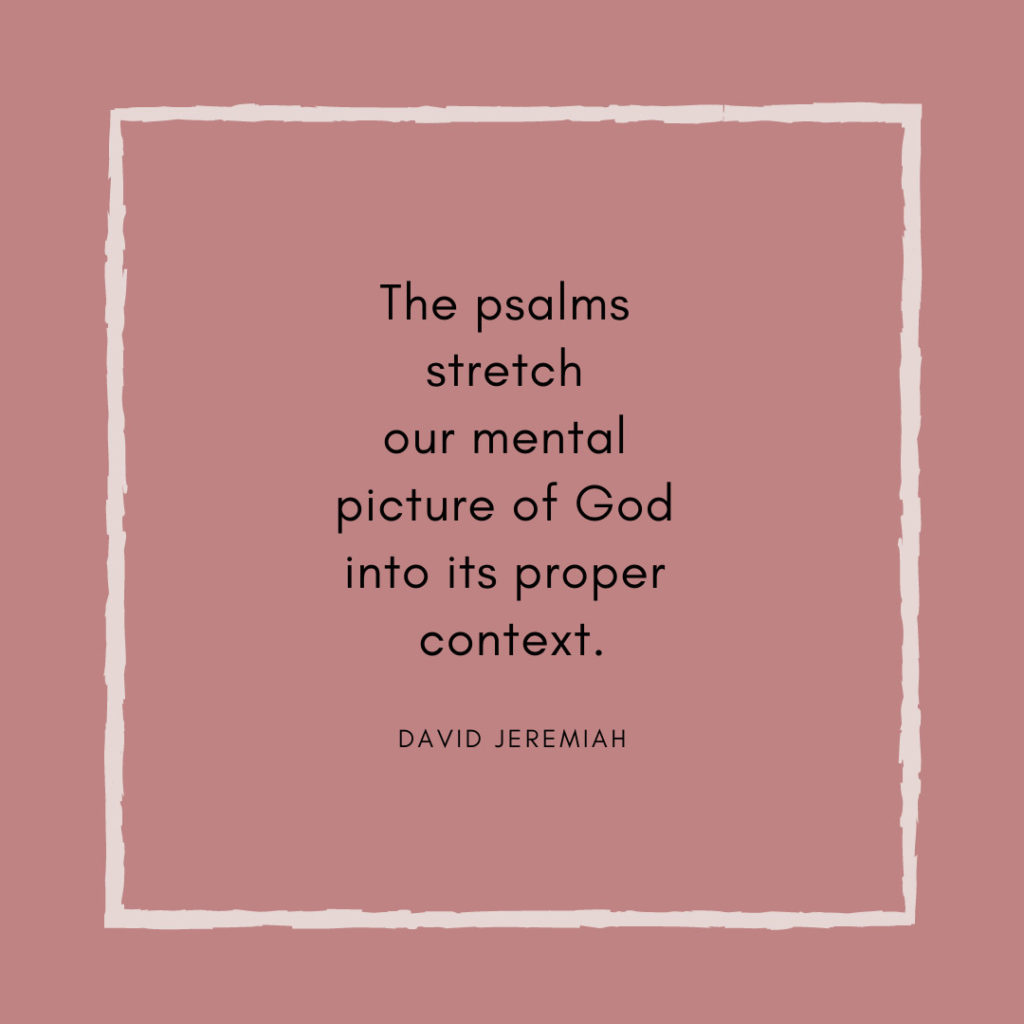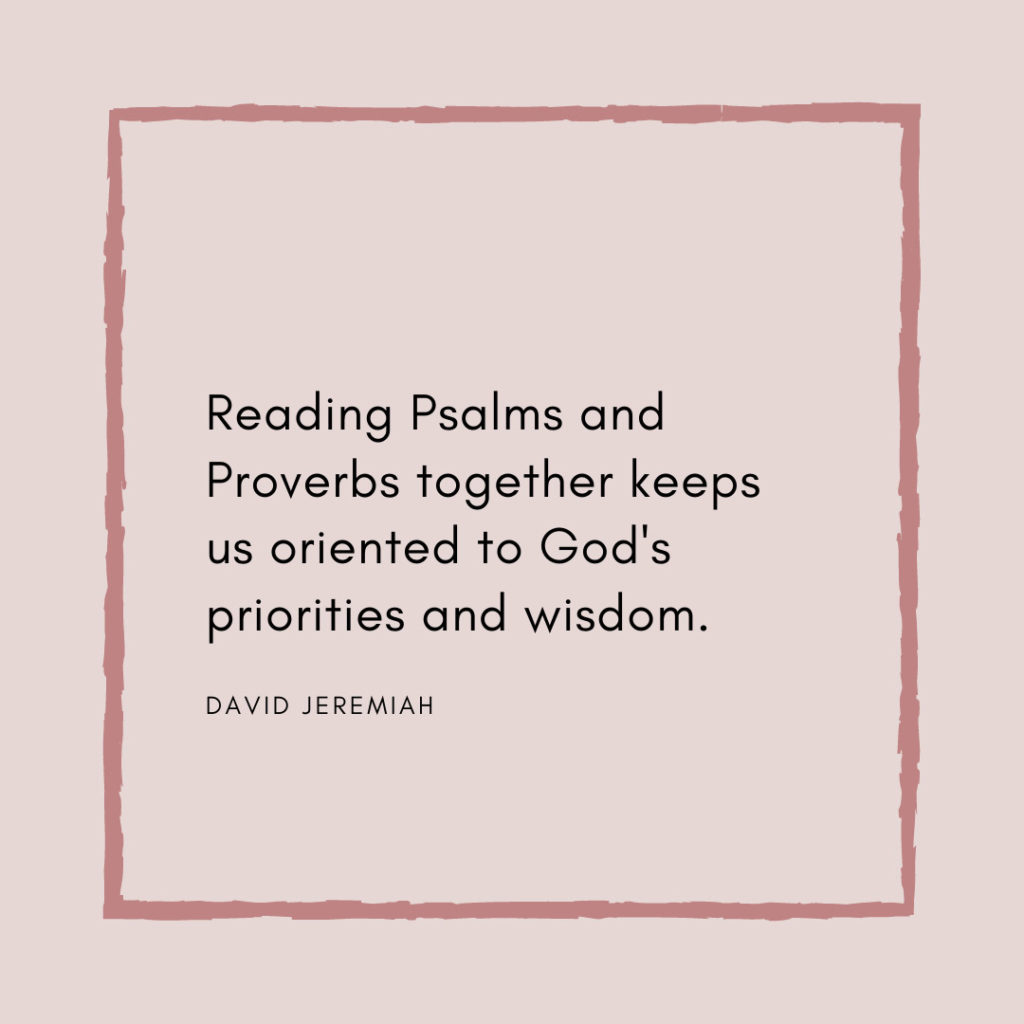Change the oil in the car. Cook at home more often. Get adequate sleep. Play with the kids. Balance the budget. Walk the dog. Read the Bible. With so many worthwhile things to do, we often struggle to fit everything in. According to LifeWay Research, most Americans have a favorable view of the Bible, but only 57% say they’ve read at least half of it.1
We may feel the effects of neglecting our physical needs first, but nothing could be more important than spending time in God’s Word. The books of Psalms and Proverbs are a perfect place to start. Both poetic and practical, they address every human emotion and instruct us in righteous living.
Consider these fifteen benefits of reading Psalms and Proverbs.
1. Connection with believers from every era.
The book of Psalms is the hymnbook of God’s ancient people. To read its words is to read lyrics that once echoed off the walls of the temple in Jerusalem. It connects us to believers from ages past.
2. Commemoration of significant events.
When God’s people gather, whether in times of grief or celebration, they sing. The psalms are a rich source of lyrics for hymns and contemporary worship music. Through these timeless words, we find the perspective to acknowledge God’s sovereignty over every circumstance.
3. Permission to plead with God.
Approximately one-third of the psalms are known as psalms of lamentation. Their writers plead with God to intervene on their behalf and beg questions that begin with “Why?” These heartfelt appeals encourage us to approach God’s throne of grace with boldness, seeking mercy and grace in our time of need (Hebrews 4:16).
4. Confirmation of God's protection and provision when we feel weak.
In Psalm 103:14, David reminds us that the Lord “knows our frame; He remembers that we are dust.” Knowing who we are and what we wrestle with on earth, God gives us reassurance that He will sustain us through it all.
5. Expression of life's highs and lows.
Perhaps no other book of the Bible can act as a companion in our daily lives, with its joys, heartaches, and dramas, as the book of Psalms does. A collection of songs, prayers, and poetry, it eloquently expresses the height and depth of human emotions.
6. Integration of body, mind, and soul.
In Matthew 22, Jesus said the greatest commandment is to “love the Lord your God with all your heart, with all your soul, and with all your mind” (verse 37). The psalms show us how to worship God—with courage, memory, intellect, and our body.
7. Magnification of God in our heart and mind.
Full of praise, the psalms magnify God in our heart, our mind, and our spirit. They stretch our mental picture of God into its proper context.

8. Inspiration to creatively worship God.
The psalmists’ vivid imagery inspires us to worship God creatively. Although we may never capture the brilliance of these writers, their words inspire us to stretch our minds to grasp the vastness of God. When we fail to find the words ourselves, we can turn to the psalms for words of worship.
9. Information about core precepts of the Bible.
Some of Christianity’s most fundamental doctrines are described in the book of Psalms: evidence for the existence of God (Psalm 19:1-4), Creation (Psalm 104), God’s plan for humanity’s redemption (Psalm 18:49), His discipline (Psalm 89:30-32; 119:67-75), and the inerrancy of Scripture (Psalm 119:60).
10. Orientation to God's priorities.
The book of Psalms reminds us to prioritize God’s Kingdom, law, glory, and standards, while Proverbs provides instructions for maintaining healthy human relationships. Reading them together keeps us oriented to God’s priorities and wisdom.

11. Instruction for righteous living.
The sayings in the book of Proverbs were intended to instruct God’s people on how to pursue righteous living. No book in the Bible sets out its purpose with greater clarity than Proverbs: “to know wisdom and instruction, to perceive the words of understanding, to receive the instruction of wisdom, justice, judgment, and equity; to give prudence to the simple, to the young man knowledge and discretion” (1:1-4).
12. Perception to discern and apply truth.
The book of Proverbs draws a sharp contrast between the wisdom of living life skillfully in the Kingdom of God and the foolishness of living apart from the knowledge of God. It not only teaches us to seek wisdom but also to apply God’s wisdom to the circumstances and relationships where we need it most.
13. Transmission of godly principles to future generations.
The phrase “my son” occurs 23 times in Proverbs, highlighting one of the primary literary features of the book: the transmission of wisdom from parents to children. The family is viewed as life’s primary context for imparting wisdom and understanding. Proverbs fits perfectly with the admonition to parents to be diligent in teaching children the ways of God and the skills for living a God-honoring life (Deuteronomy 6:4-9).
14. Correctional guidelines for authorities.
Underlying Proverbs is the understanding that human beings need training, correction, and discipline. (In the Hebrew, the word for discipline occurs some thirty times in this book.) Because we all lack wisdom, instruction is needed, especially for children. Proverbs presents two kinds of correction: one initiated by parents or authorities, and one that flows naturally from violating God’s principles (reaping what we sow).
15. Communication strategies for building healthy relationships.
Proverbs highlights the importance of our speech: it can lead others to knowledge and bring healing to relationships, or it can be destructive when used recklessly or harshly. Throughout Proverbs, we are reminded that our words are powerful and must be weighed carefully by both speakers and listeners.
Psalms and Proverbs appear side by side in the center of the Bible for a reason. As citizens of heaven, we need a hymnal to fill us with praise to God. As citizens of earth, we need a practical manual for self-improvement in every day matters. Together these books can help us navigate any storm that comes our way.
Sources:
1Bob Smietana, “LifeWay Research: Americans Are Fond of the Bible, Don’t Actually Read It,” LifeWay Research, April 25, 2017, https://lifewayresearch.com/2017/04/25/lifeway-research-americans-are-fond-of-the-bible-dont-actually-read-it/, accessed on December 5, 2019.
